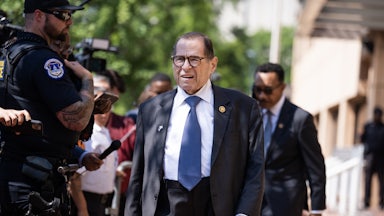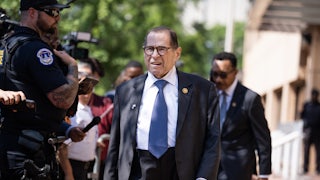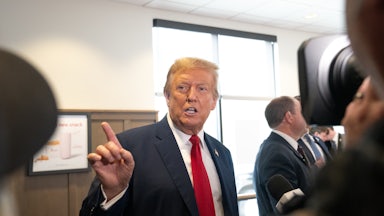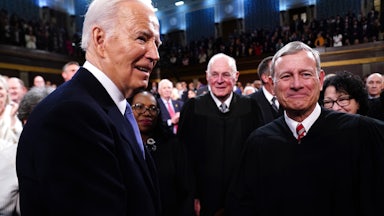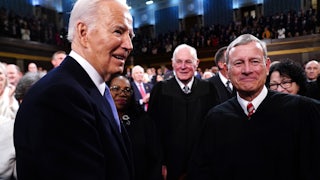How does Joe Biden plan on beating Donald Trump? Twelve days after the worst debate performance in American history, we still have no answer to that pressing, existential question.
For nearly two weeks now, Democrats have been in a (wholly justified) panic. On June 27, Biden raised alarming concerns about his physical and mental fitness as he repeatedly failed to answer simple, predictable questions with anything approaching coherence. It is not clear if he has the ability to finish out this term, let alone another one. It is certainly not clear that he can undergo the rigors of a presidential campaign, let alone one with these extraordinary stakes. If he loses, the federal government may very well be transformed. Millions may be deported. The Supreme Court has given Donald Trump carte blanche to behave like a king.
But as voters and elected Democrats have raised serious concerns about Biden’s ability to serve both as the party’s nominee and as president, Biden is the one behaving like a monarch. He is barely attempting to alleviate concerns about his stamina or health. Instead, he has, Trump-like, been on an imperial ego trip. Far from trying to assuage worried Democrats, he is giving the party an impossible choice: It can remain behind him as the party’s nominee, or he will tear down any possible replacement.
He has, during this period of crisis, surrounded himself not with cool-headed advisers but with family members, including his son Hunter, who was recently convicted of several felonies. These family members have convinced him that everyone is out to get him: his fellow Democrats, the media, anyone rational enough to see the dangers of running an 81-year-old who struggles to string two sentences together. Little, if any, work has gone into answering the questions Biden’s debate performance raised. Instead, we have had a petulant and pathetic display from a president who had promised to serve as not only a public servant but a “bridge” away from rule by a megalomaniac bent on twisting the presidency for his own craven purposes.
Biden has, over the last two weeks, isolated himself from voters and from his party. He has made a handful of public—or public-ish—appearances that have done little to inspire renewed hope in him. These have consisted of friendly interviews—some of which only featured questions that had been preselected by the White House—and brief speeches with the aid of a teleprompter. A 30-minute television interview may have staunched the bleeding, but it provided little evidence that the president can speak for any significant amount of time without raising concerns about his age.
He has been far from convincing—stumbling, muttering, losing his train of thought. He is still 81 years old and will be until Election Day. (He turns 82 on November 20.) If you are concerned about the president’s age—and three-quarters of voters are, according to polls—there has been nothing to convince you that he can withstand a full campaign schedule. There has certainly been nothing to assure you that every public appearance or speech will not be accompanied by evidence of his advanced age.
There has been quite a lot, however, to assure you that Biden intends to destroy the party if anyone works to convince him that it is best not just for his party, but for the nation, to step down. He has made it abundantly clear that he does not plan to go down without a fight—even if it wrecks him, his party, and the nation together. He has succeeded in making this election an impossible choice, between lining up behind an increasingly feeble octogenarian who is losing—and chaos.
Behind all of this is Biden’s considerable ego. There is a kingly insistence that only he can do the job of the presidency and that only he can take down Trump. There is little reason to believe that either thing is true. His vice president, Kamala Harris, is fully capable of both jobs. A number of prominent Democrats, including Harris but also several governors, are running ahead of Biden in some polls. You can be certain that these challengers would face some scrutiny if they became the nominee but also that they would not be hounded by a vulnerability that cannot be addressed. All of them are in their fifties and sixties. They are all capable administrators. They can do the job of the presidency. And they can beat Donald Trump, a historically weak candidate whose popularity has never risen above the low 40s.
Biden and his team have succeeded in holding onto the nomination by framing questions about his ability to continue as a battle against elites. On the one hand, there is Biden, his family, and a handful of vocal defenders. On the other hand, there is the commentariat, donors, and a large number of elected Democrats who happily grouse to reporters anonymously about their dire interpretation of the president’s reelection chances but say little publicly. That silence helps Team Biden dismiss the worries as coming from a panicky ruling class disconnected from actual voters. Biden has, in a very Trumpian turn, painted himself as not just an underdog but a victim—someone fighting elites and special interests who have it out for him, often in vague, sinister, and unspecified terms.
The fact that Democrats are roughly evenly divided over whether he should continue as the party’s nominee—and that 80 percent of voters have concerns about his age—has rarely factored in. No one wants to publicly come out against Biden continuing because the potential consequences are significant. An elected Democrat would face personal and professional risks for saying what is obvious to so many. There would be blowback. If Biden continues as the nominee and loses, they will be blamed. Efforts to organize opposition to his candidacy have largely fizzled for this reason.
Biden and his team have, in other words, successfully made this a very Trumpian palace intrigue story. Voter anxiety is discounted in service to the warring-elites narrative. It is a performance as selfish, pathetic, and histrionic as any of the Trump era. And yet this man will almost certainly be the Democratic nominee.
Four years ago, he was a very different nominee. For one thing, he could reassure voters who were concerned that he would take office as the oldest president in American history. But he was also an ideal contrast to Donald Trump: Someone who credibly make the case that he could return a spirit of decency and selflessness to the office of the presidency, someone who could be consistently relied upon to put the interests of the country above his own.
The case against Donald Trump is as simple and easy to make now as it was then: He is not and has never been popular, and for good reason. He is incompetent, venal, narcissistic. He is a convicted felon, certified con man, and abuser of women. He puts himself before everything else.
Here’s the big problem, though: Joe Biden is just as unpopular. He has spent the last two weeks on a salted-earth campaign to ensure that he remains the Democratic nominee. Instead of demonstrating that he has the energy to prosecute the case against Donald Trump, he has been holed up in the White House, surrounded by sycophants and loyalists, all of them lashing out at “elites” and “the media.” It’s Trumpian—and it should be disqualifying.
That it isn’t should raise serious concerns about Biden and Democratic leadership writ large. We are in a moment that recalls the Trump era. The president is engaged in a vitriolic campaign against a shadowy cabal of enemies in the media and his own party. He has transformed his political project into one built on his own grievances. There are significant questions about his competence and his ability to lead the country. Democrats should line up behind a candidate who can run as a contrast with Donald Trump—not behind one who increasingly resembles him.

